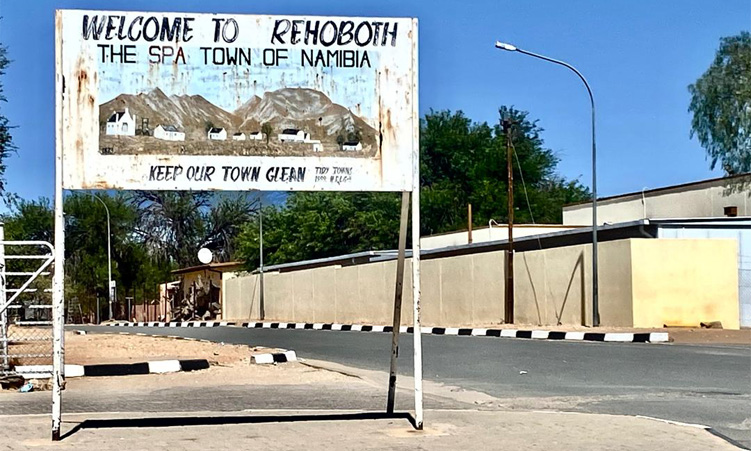A FULL bench of the High Court yesterday dismissed a bid for a second court order for the release of the 13 Caprivi high treason suspects who, in February, succeeded in challenging the High Court’s jurisdiction to try them.
The 13, who were re-arrested and re-charged with high treason after Judge Elton Hoff had on February 23 ordered their release, had asked the High Court for an urgent interdict to declare their re-arrest unlawful and to order their immediate release. They got the answer to their request yesterday, when the court avoided a ruling on the legality of their re-arrest, but dismissed their application for an order for their release, in main because an appeal against Judge Hoff’s judgement of February is still pending in the Supreme Court.Yesterday’s judgement was written by acting Judge Petrus Damaseb with the agreement of Judge Annel Silungwe and acting Judge John Manyarara.Judge Hoff had ruled on February 23 that the 13 high treason accused who had questioned the High Court’s jurisdiction over them had been brought before the court irregularly, and that the court therefore had to decline assuming jurisdiction over them.His main argument was mostly that they had been brought to Namibia and before the court by a process of “disguised extradition” from Zambia and Botswana, without proper, legally prescribed extradition procedures being followed.He ordered their release based on that reasoning.Because alleged key figures in a plot to secede the Caprivi Region from the rest of Namibia were claimed to have been included in the group of 13, Judge Hoff’s ruling represented a major setback to the State in its prosecution of people accused of involvement with the alleged separatist movement.The 13 did not walk free from the High Court at Grootfontein after Judge Hoff’s ruling, though.Official paperwork for their release was completed at the court – and then they were again arrested on charges dating from as far back as 1992.These charges – subsequently alleged to have been trumped up from the start – were again dropped two days later.On the evening of February 25, the 13 were indeed allowed to walk from the Grootfontein Police Station as supposedly free men – only to be re-arrested again a few minutes later, this time again on charges of high treason, murder, attempted murder and others.They remain in custody and are set to appear in the Katima Mulilo Magistrate’s Court on those charges again today.On Monday, the Supreme Court is scheduled to start hearing an appeal that the State had lodged against Judge Hoff’s ruling.That appeal dealt the fatal blow to the thirteen’s release bid yesterday.Acting Judge Damaseb noted about halfway through the judgement on the release bid, that “the crisp issue” raised by the application of the 13 was whether their re-arrest for high treason on February 25 was lawful in view of the fact that by then Judge Hoff had ruled that the High Court had no jurisdiction over them, as he saw it.Only a few pages further in the judgement, acting Judge Damaseb proceeded to side-step just that “crisp issue” that he had pointed out.”I do not find it necessary to decide whether or not re-arrest following an order that the High Court has no jurisdiction is lawful, nor whether the noting of a petition to the Chief Justice or the actual grant of the petition for leave to appeal in circumstances such as the present, suspends a release order of the court,” he stated.”These are important and interesting issues which, when the right set of facts present themselves, the courts of our country will have to resolve on some future date.”Because of the conclusion that he was to reach in his judgement, that would not be necessary now, he continued.If the High Court was to declare the re-arrest of the 13 unlawful without ordering their release, he went on, the court’s judgement would be reduced to a mere advisory opinion.Similarly, and perhaps more seriously, the consequences of declaring the re-arrests unlawful and ordering that the 13 be released – thus allowing them to place themselves beyond the reach of the jurisdiction of the courts of Namibia – before the Supreme Court makes a final and binding ruling on the issue, would render a later Supreme Court judgement an advisory opinion which would also not be enforceable, acting Judge Damaseb stated.”It is no small matter that there is now pending before the highest court in the land a live appeal on the ruling (…) that the courts of Namibia have no jurisdiction to try the applicants,” he stated.For the High Court to now shut its eyes to that would be artificial, he commented.”If that argument is to hold sway, it would mean that there is no productive purpose to be served by the appeal now before the Supreme Court.The workings of the judiciary would then become a great mystery to the public whose interest it is meant to serve.”Public confidence in the judiciary (which is not the same thing as public pressure) will be seriously undermined if this Court arrives at a decision which effectively results in undermining the authority of the highest court in the land,” he added.”It is true, of course, that judges must perform their functions independently of public pressure; but it is equally true that public confidence in the judiciary is very important in a modern democracy such as ours.”Senior counsel Theo Frank argued the case of the 13 before the full bench three weeks ago.Jeremy Gauntlett, SC, successfully opposed it on behalf of Government, the Minister of Home Affairs and the Prosecutor General.They got the answer to their request yesterday, when the court avoided a ruling on the legality of their re-arrest, but dismissed their application for an order for their release, in main because an appeal against Judge Hoff’s judgement of February is still pending in the Supreme Court.Yesterday’s judgement was written by acting Judge Petrus Damaseb with the agreement of Judge Annel Silungwe and acting Judge John Manyarara.Judge Hoff had ruled on February 23 that the 13 high treason accused who had questioned the High Court’s jurisdiction over them had been brought before the court irregularly, and that the court therefore had to decline assuming jurisdiction over them.His main argument was mostly that they had been brought to Namibia and before the court by a process of “disguised extradition” from Zambia and Botswana, without proper, legally prescribed extradition procedures being followed.He ordered their release based on that reasoning.Because alleged key figures in a plot to secede the Caprivi Region from the rest of Namibia were claimed to have been included in the group of 13, Judge Hoff’s ruling represented a major setback to the State in its prosecution of people accused of involvement with the alleged separatist movement.The 13 did not walk free from the High Court at Grootfontein after Judge Hoff’s ruling, though.Official paperwork for their release was completed at the court – and then they were again arrested on charges dating from as far back as 1992.These charges – subsequently alleged to have been trumped up from the start – were again dropped two days later.On the evening of February 25, the 13 were indeed allowed to walk from the Grootfontein Police Station as supposedly free men – only to be re-arrested again a few minutes later, this time again on charges of high treason, murder, attempted murder and others.They remain in custody and are set to appear in the Katima Mulilo Magistrate’s Court on those charges again today.On Monday, the Supreme Court is scheduled to start hearing an appeal that the State had lodged against Judge Hoff’s ruling.That appeal dealt the fatal blow to the thirteen’s release bid yesterday.Acting Judge Damaseb noted about halfway through the judgement on the release bid, that “the crisp issue” raised by the application of the 13 was whether their re-arrest for high treason on February 25 was lawful in view of the fact that by then Judge Hoff had ruled that the High Court had no jurisdiction over them, as he saw it.Only a few pages further in the judgement, acting Judge Damaseb proceeded to side-step just
that “crisp issue” that he had pointed out.”I do not find it necessary to decide whether or not re-arrest following an order that the High Court has no jurisdiction is lawful, nor whether the noting of a petition to the Chief Justice or the actual grant of the petition for leave to appeal in circumstances such as the present, suspends a release order of the court,” he stated.”These are important and interesting issues which, when the right set of facts present themselves, the courts of our country will have to resolve on some future date.”Because of the conclusion that he was to reach in his judgement, that would not be necessary now, he continued.If the High Court was to declare the re-arrest of the 13 unlawful without ordering their release, he went on, the court’s judgement would be reduced to a mere advisory opinion.Similarly, and perhaps more seriously, the consequences of declaring the re-arrests unlawful and ordering that the 13 be released – thus allowing them to place themselves beyond the reach of the jurisdiction of the courts of Namibia – before the Supreme Court makes a final and binding ruling on the issue, would render a later Supreme Court judgement an advisory opinion which would also not be enforceable, acting Judge Damaseb stated.”It is no small matter that there is now pending before the highest court in the land a live appeal on the ruling (…) that the courts of Namibia have no jurisdiction to try the applicants,” he stated.For the High Court to now shut its eyes to that would be artificial, he commented.”If that argument is to hold sway, it would mean that there is no productive purpose to be served by the appeal now before the Supreme Court.The workings of the judiciary would then become a great mystery to the public whose interest it is meant to serve.”Public confidence in the judiciary (which is not the same thing as public pressure) will be seriously undermined if this Court arrives at a decision which effectively results in undermining the authority of the highest court in the land,” he added.”It is true, of course, that judges must perform their functions independently of public pressure; but it is equally true that public confidence in the judiciary is very important in a modern democracy such as ours.”Senior counsel Theo Frank argued the case of the 13 before the full bench three weeks ago.Jeremy Gauntlett, SC, successfully opposed it on behalf of Government, the Minister of Home Affairs and the Prosecutor General.
Stay informed with The Namibian – your source for credible journalism. Get in-depth reporting and opinions for
only N$85 a month. Invest in journalism, invest in democracy –
Subscribe Now!






